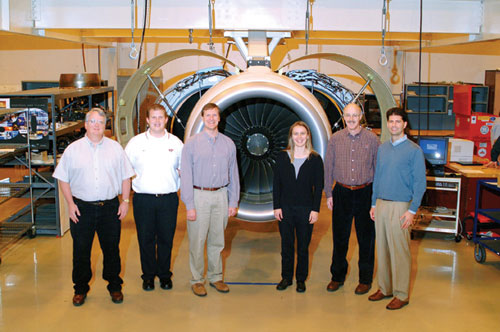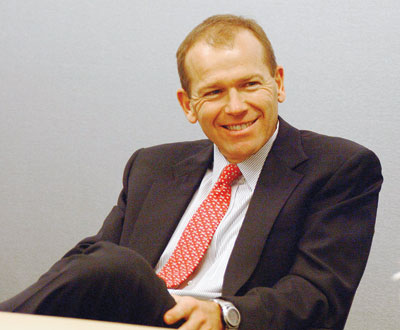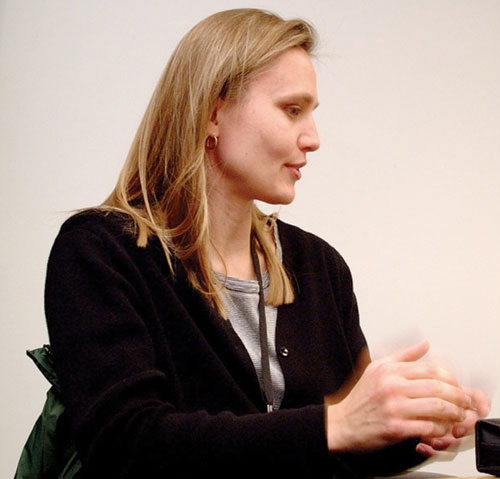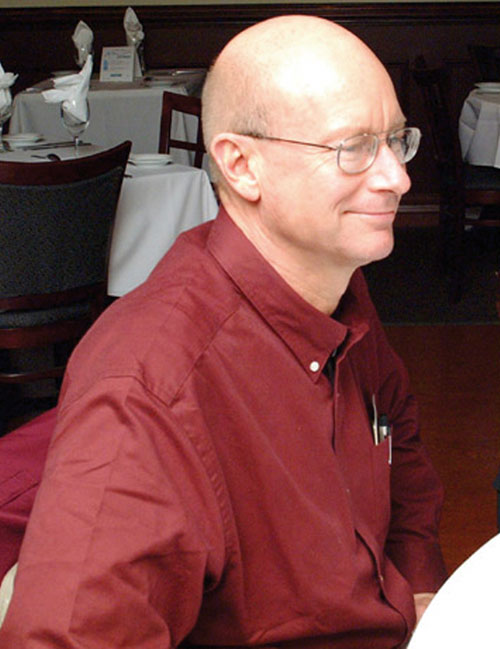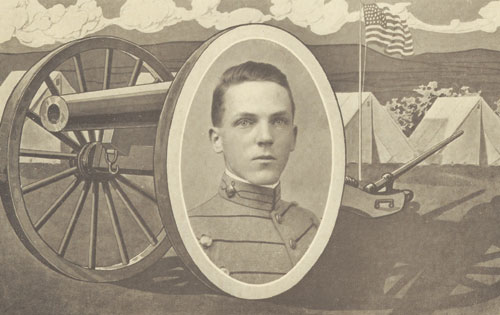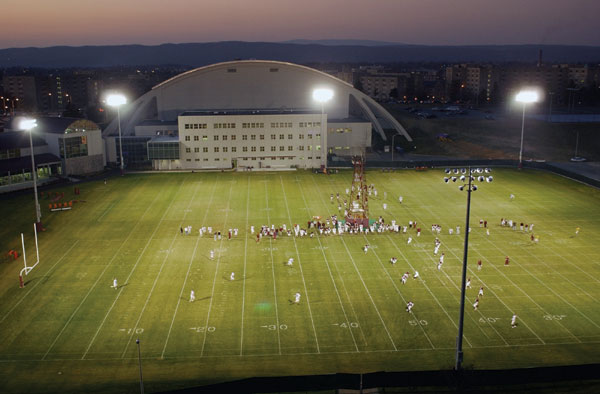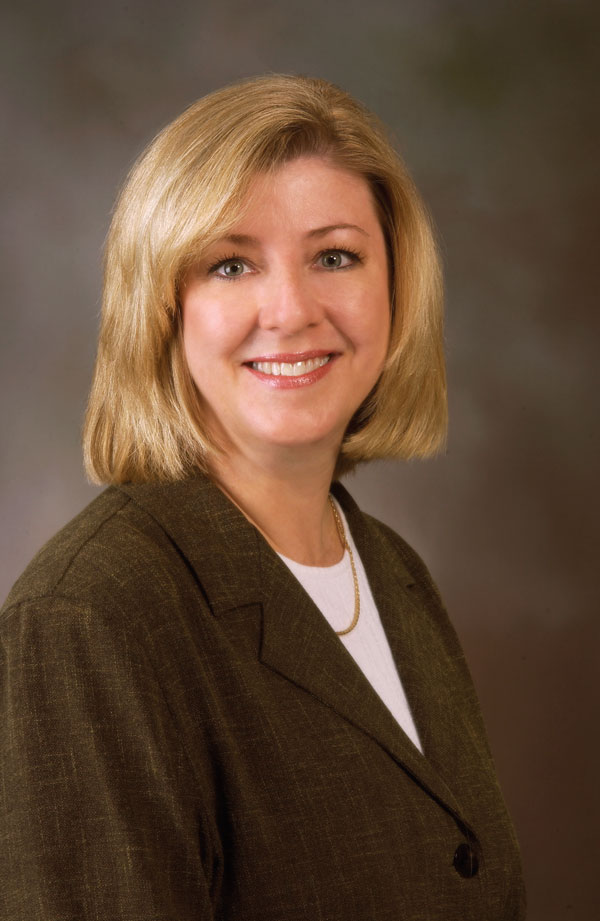|
Remember the last time you traveled on a regional jet? Perhaps you were visiting clients in Atlanta or family in Texas, or maybe you were flying into the Roanoke airport to visit Virginia Tech. No matter where you were flying in the United States, chances are good that the regional jet was powered by a General Electric (GE) aircraft engine. Odds are also good that the engine was designed by a fellow Hokie.
Because they are Tech alumni, Calhoun and Blankenship know of what they speak. "My accounting degree from Virginia Tech got me ready to contribute," says Calhoun. "I may not use it day in and day out, but I wouldn't be here without it. It was an important building block." Calhoun oversees an impressive array of successes at GE Transportation, particularly in aircraft engines. GE is a leading engine manufacturer for the military in the United States and abroad. They are also the leading engine supplier to commercial aviation--by a long shot--on every continent. Says Calhoun, "I'm really proud of what GE Transportation has accomplished. Our investment--$1 billion annually on new products--allows us to maintain our competitive edge. "Chip and I made a bet that small airplanes would become a real competitive advantage in the marketplace and we decided to invest a lot of time and energy in that market," he adds. "But truthfully, I was very proud that a couple of Hokies were sitting in a room and talking about spending a billion dollars." Blankenship leads the team that designs, builds, and supports the CF34 engine, which sparked one of the most important events in commercial aviation: the introduction of the regional jet. When Blankenship began assembling a team to develop a new CF34 growth engine, he looked for the best engineers that GE had to offer. There are nearly 4,000 engineers at GE, and it wasn't until the team had gathered in Evendale, Ohio, to begin work on the CF34 that he realized how many Tech graduates were sitting around the table. "I was amazed at the number of Hokies I found," says Blankenship. As with the value of private philanthropy, the importance of corporate philanthropy to Virginia Tech cannot be overstated, and General Electric truly is one of the university's most important corporate partners. For more information about the relationship between GE and Virginia Tech and more GE Hokie profiles, visit http://www.givingto.vt.edu. GE HOKIE PROFILES Included among the more than 600 Hokies employed by General Electric around the world are nearly 50 Hokies working for GE Transportation in Evendale, Ohio, just north of Cincinnati. Here are just a few:
Amy Boyce is special projects editor for the Office of University Development.
Hankins' $1.69 million estate gift helped fund Virginia Tech's state-of-the-art football practice field on which 21st-century champions train. Completed in 2001, the facility--actually two side-by-side fields--helps attract and prepare top athletes who continue the Hokies' tradition of excellence. Today's field is a far cry from an early site described in the 1911 Bugle: "Practice was held in a wheat field laid off with a plow, and it was about as level as a side of Brush Mountain." Located next to the Merryman Center, Virginia Tech's modern practice field boasts a sand base and a zoned irrigation system for turf that withstands rigorous training. Lighting allows evening practice in late fall, saving wear and tear on Lane Stadium's playing surface, formerly the only after-dark practice area. In cold weather, special covers protect the sod, allowing sun and rain to filter through.
Virginia Tech Head Football Coach Frank Beamer values the new facility. "We are fortunate to have some of the best practice fields in the country. Not only is the location perfect for us, the make up of the sand-based fields allows us to use them in nearly all weather conditions." Hankins, who died in 1974, transformed football practice at Virginia Tech by naming the university as beneficiary in his will. His gift came to the university under the terms of a trust that first provided support for his wife for the rest of her life. After her death in 1999, the balance of the trust came to Virginia Tech as the residuary beneficiary, establishing Hankins' legacy at his alma mater. Hankins' senior portrait shows a handsome cadet with a direct gaze. He was president of the Senior Mechanical Engineers, belonged to the German Club, served as an editor on the yearbook staff, and even played Barnstorm Walker in the college's production of The Widow McGinty. And through his estate gift, Hankins has become part of every game, every touchdown, and every crowd that cheers a Hokie victory. He never ran out on the field, helmet in hand, with television cameras following his every move, but if you listen to the roaring crowds, you can almost hear echoing shouts for the young lieutenant from Company A. Across the decades, it's a cheer for Hankins: "Hokie, Hokie, Hokie, Hy!" Virginia Tech says thank you, Cyrus. The Virginia Tech Bugle archives can be viewed on-line at http://spec.lib.vt.edu/archives/bugle/index.html. If you would like to know more about making an estate gift to Virginia Tech, a gift planning officer would be pleased to provide information, answer your questions, and, if you wish, provide a sample gift plan tailored to your unique situation. Phone 800/533-1144 or 540/231-2813 or e-mail giftplanning@vt.edu.
Judith Davis is a publications editor in the Office of Gift Planning.
Fay Street (finance '77) and Becky Porter have accepted the call to be co-chairs of the Women and Leadership in Philanthropy (WLP) council. The council will consist of women who are interested in making a positive impact at Virginia Tech, both through their philanthropy and their service. The council will guide the activities of the larger WLP initiative and help Mary Grace Theodore, WLP program director, develop activities for the initiative. Fay Street Street and her husband, Nicholas, currently reside in Bristol and are both graduates of Virginia Tech. She went on to law school at the University of Richmond and has been involved in various civic and charitable endeavors over the years. Street's time at Virginia Tech inspired her to become involved in the WLP initiative. "Virginia Tech gave so much to me as a student and now I can hopefully be of service to the university," she says. "As women, we can bring our experiences, talents, and ideas to the table along with a financial commitment." Even though the WLP program is in its infancy, a number of women have already begun to recognize the possibilities of its success, Street says. "It's made me think differently about what I can do to help Virginia Tech." Becky Porter Porter’s acceptance of this position underscores the importance that Virginia Tech's friends play in shaping the university's future. Though Porter is a graduate of the University of North Carolina at Chapel Hill, there is no doubt about her devotion to Virginia Tech. Both Porter and her husband, Greg (business administration '62), are members of the campaign steering committee. Of their five children, two are alumni and one is currently working on her M.B.A. from the Pamplin College of Business at the Northern Virginia campus. But the family's connection to Tech goes even deeper. Greg's grandmother, Mary Preston Ellzey, was born at Solitude and her father, Mason Graham Ellzey, was one of the first professors at Tech in the 1870s and 1880s. Philanthropy is critical to the continuing success of Virginia Tech, and Porter feels there is a real place for women in the philanthropic activities of the university. She observes that women tend to be shocked when they are invited to become active members of the university community. "Most of our donations and contributions have been through our husbands and the men in the family, but now we're thinking how we as women can do more for Virginia Tech on our own." Street notes that "The advancement of education benefits everyone." Porter agrees. "I think the program will help women to see what we can accomplish together, regardless of money or time." Mary Grace Theodore Two years ago, when asked by Elizabeth Flanagan, vice president for development and university relations, to head up the initiative, Theodore was delighted at the opportunity. "The Women and Leadership in Philanthropy initiative is about more than securing financial support for the university," she says. "Virginia Tech's alumnae and friends have so much to offer and we want to really get them involved in the life of the university." * The first WLP Council meeting will be held April 29. This year's Circle of Excellence Retreat will be held June 5-7. |
